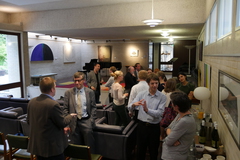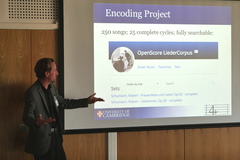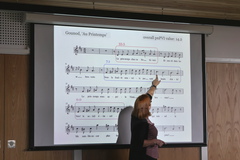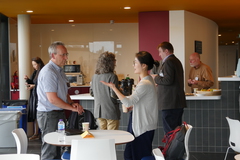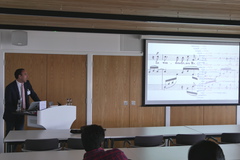Scores of Scores
‘Scores of Scores’ is a project for creating and releasing publicly a large number of high-quality musical scores which any internet user will be able to play, download, transpose and use as they please copyright-free (under a CC0 license). As of 2020, in addition to the scores, we are also running a parallel collection of harmonic analyses. Here are the new notes for analysts.
This project is in association with OpenScore and to date offers two major collections:
- OpenScore Lieder Corpus (over 1,300 songs),
- OpenScore String Quartets.
URL Menu
- The scores are all on MuseScore.com (lieder here, string quartets here) where they are available to play online, download in multiple formats, transpose, and more;
- We also provide a ‘mirror’ (copy of all the scores) where you can download the whole collection at once. The lieder mirror is here and the equivalent for string quartets will follow soon.
- This page provides an introduction to the project;
- There are further, dedicated pages here with notes for transcribers and notes for users;
- ‘Learn by Doing Lieder Transcription’: Suggested transcription-based exercises for the intrepid student of music theory;
- Homepage for the launch event, ‘Scores of Scores’: Possibilities and Pitfalls with Musical Corpora.
- Notes for analysts
But first, here’s an example from the lieder collection:
Schumann, Clara - Lieder, Op.12, No.4 - Liebst du um Schönheit on the OpenScore LiederCorpus main site
Overview and motivation
IMSLP has led the way with an initiative to provide the world with a huge repository of out-of-copyright musical scores in PDF (image) format. This has greatly increased access to music, and enabled musicians to explore the repertoire more widely, more easily. This is great, but people are able to engage with music in much more direct and varied ways when they have access to ‘encoded’ score: not PDFs, but files which can be opened in free notation software like ‘MuseScore’ and adapted for specific tasks. The difference is the same as that between looking at an image of text and being able to edit that text in a word-processor. There are some corpora of scores in these editable formats, but they are inconsistent in their coverage and quality. Similarly, the existing ‘Optical Music Recognition’ software for converting from score images to encoded format is not yet up to the task at scale and will be helped along by having reliable image-encoding pairs to work with.
The many popular uses of encoded scores include extracting a single part for private practice, creating arrangements for whatever musical forces are available, and making bespoke teaching resources (an ongoing focus for ‘Four Score and More’). It is also be useful to ‘Music Information Retrieval’: an academic field that analyses structural patterns in music. (For users interested in these academic uses, please see the GitHub corpus mirror.)
Collaborators and engagement
We aim to engage with the widest possible public: anyone interested in music, of any age, ability, and nationality. To that end of engaging with that wide audience, we are delighted to have active collaborations with a range of partners.
MuseScore/OpenScore
MuseScore/OpenScore have connected us with their awesome community of encoders, and are hosting the final scores. The online repositories (lieder here, string quartets here) ensures that there is no geographical barrier to encoding or accessing the scores. Just as importantly, there is also no financial barrier to entry thanks to MuseScore: a free, open-source, and high-quality notation software which can import/export to musicXML, and by extension to all industry-standard file types. Perhaps most remarkably of all, even blind musicians will be able to access the scores through the music21-enabled Braille output.
Thanks as always to our wonderful team, associates, collaborators and funders.
Funding
While ‘Scores of Scores’ is an almost entirely volunteer-driven effort, we do have occasional We gratefully acknowledge support in kind from MuseScore and the various universities I’ve been involved with, as well as project funding from:
- The University of Cambridge who supported the 2018 initiation of ‘Scores of Scores’ from the Arts and Humanities Impact Fund;
- The Central New York Humanities Corridor who have funded events since 2020.
How can people get involved?
We are currently focussed on the quartets: please see this page for details. Everyone is welcome regardless of background or experience.
Launch event
In association with the Cambridge Big Data Strategic Research Initiative, Cambridge Digital Humanities Network and the University of Cambridge Faculty of Music, a ‘Scores of Scores’ event took take place on 19 June 2018, combining elements of a conference, workshop, hackathon, and ‘encodathon’. This saw the launch of both the ‘Scores of Scores’ encodings, and also a first application of those scores: the ‘Cut Outs’ automatic music theory exercises.
 Four Score and More
Four Score and More






